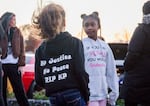Civil rights organizations are calling on the U.S. Department of Justice to investigate the two largest law enforcement agencies in Southwest Washington for discriminatory policing.
The American Civil Liberties Union of Washington and the National Association for the Advancement of Colored People’s Vancouver chapter jointly urged Justice Department officials Wednesday to open a federal investigation into the agencies’ “pattern of deadly force, disparate policing, and favoritism toward known white supremacist extremist groups.”
The agencies named are the Vancouver Police Department and the Clark County Sheriff’s Office. The civil rights organizations also highlight a drug task force that both agencies participate in.
“Federal intervention is necessary for all residents in Clark County to receive equal and fair treatment, constitutional policing, and to feel safe in their communities,” Enoka Herat, an ACLU of Washington attorney, said in a statement.
An investigation could lead to a top-down review of the agencies’ protocols by federal prosecutors. And if the Justice Department finds an agency is violating civil rights, it could be placed under an oversight program for years. Excessive force landed the Seattle Police Department under the department’s eye in 2011, as did the Portland Police Bureau in 2014. Both agencies remain under federal oversight.
The request is a culmination of recent controversies that have embroiled the agencies. Since 2019, the agencies have shot and killed eight people.
Of those eight, five — or roughly 63% — were either Black or Pacific Islander. Meanwhile, Black and Pacific Islander residents make up a combined 3% of the Clark County population. The deaths include Clayton Joseph, 16; Carlos Hunter, 43; Kevin Peterson Jr., 21; Jenoah Donald, 30; and Kfin Karuo, 28.
The other three, the groups note, had been unhoused and grappling with mental health issues. They include Michael Pierce, 29; William Abbe, 50; and Andrew Williams, 41.

A girl wears a sweatshirt honoring Kevin Peterson Jr. on Oct. 29, 2021. On the anniversary of Peterson's death, his family visited the site where a regional drug task force shot and killed him during an attempted drug sting.
Troy Brynelson / OPB
In a 31-page letter, the ACLU and NAACP chapters further argue data show uneven policing practices when it comes to uses of force, jail demographics and traffic stops. The groups also raise concerns about the prevalence of far-right groups in Southwest Washington and how law enforcement interacts with them.
“I think the numbers that we’re seeing of policing killings in Clark County — by the sheriff’s office and the Vancouver Police Department — and use of force patterns and traffic stops show a story of discriminatory policing,” Herat said.
Nearly all of the eight shootings have been ruled justified. The lone exception is that of Kfin Karuo, a 28-year-old Vancouver man of Micronesian descent. That shooting happened last month, and the investigation is ongoing.
Members of the civil rights organizations said Wednesday the justified findings show a continued lack of accountability in high-profile shootings. In petitioning for federal intervention, they said they hoped to see an investigation into the departments’ cultures and practices.
“Having all of these killings justified absolutely is the motivator in this because there’s no accountability. It’s a free for all,” said Jasmine Tolbert, NAACP Vancouver president. Accountability, she said, is still the goal. “And this is where this starts.”
Nickeia Hunter, Carlos Hunter’s sister who has since become a police reform activist, said she and others don’t want to see police defunded, but to be better trained.
“We need more training and less time at the range,” Hunter said.
Higher rates of force, incarceration and traffic stops
In the letter, the civil rights groups lay out statistics about Clark County law enforcement practices.
On deadly force, the groups noted Clark County’s Black population is around 2.4%, yet comprise two-thirds of the killings. Likewise, the Pacific Islander community — which two of the eight men identified as — make up less than 1% of the county population.
Outside of the fatal encounters, the groups asserted Vancouver police’s use of force against Black and Pacific Islanders has risen. From 2019 to 2020, the share of force used on Black people rose from 13.4% to 17.1%. For Pacific Islanders, 2.3% to 2.8%.
The groups also noted a recent audit showed Vancouver police failed to record a person’s ethnicity on half their use of force reports, instead listing ethnicity as “unknown.” The audit was commissioned by the city in 2019 after officers fatally shot Joseph, Pierce and Hunter in a five-week span.
That same audit found Vancouver police’s use of force rose by 65% across the board from 2017 to 2019, but couldn’t point to any policy or reporting changes as an explanation.

A memorial to Kevin Peterson Jr. hangs on the anniversary of his fatal shooting during an attempted drug sting. Peterson is one of eight people — including five people of color — killed by law enforcement in Clark County since 2019.
Troy Brynelson / OPB
The county-operated jail is another potential arena for discrimination, according to the ACLU and the NAACP. In 2018, Black people were jailed at a rate of 1,011 people per 100,000 residents in Clark County — five times higher than white people’s 214 people per 100,000.
“This staggering difference in the rate at which Black people versus white people are jailed may reflect disparities in policing that lead Black people to be arrested at much higher rates,” the groups wrote. “An analysis of arrest data for VPD and CCSO would help tell us more.”
The groups compared state and national jail data, too. The most recent year available, 2015, showed law enforcement put Black people in Clark County in jail at a rate of 967 per 100,000 — higher than the national average of 847, and nearly twice the state rate of 492.
On traffic stops, the groups said they obtained data via public records requests that showed police stopped Black and Hispanic drivers 2.3 times more often than white drivers. And police pulled over Pacific Islander drivers at 2.8 times the rate of white drivers, the groups said.
Homelessness and mental illness also appeared to be a factor in who police interact with, the groups noted. All three of the white men killed recently had been experiencing homelessness and showed signs of mental illness.
Vancouver police’s use-of-force data showed that roughly one-third of all incidents involved a person that officers deemed had at least one mental health indicator, the group said.
Deference to far-right groups
The letter to the Justice Department raises concerns about Vancouver police and the Clark County Sheriff’s Offices relationship with far-right groups, such as Patriot Prayer and founder Joey Gibson.
Patriot Prayer, based in Vancouver, has attracted violent, far-right members. Gibson faces felony riot charges stemming from a May 2019 brawl between his group and antifascist activists outside the now closed Portland bar Cider Riot.
The letter raises concerns about how often law enforcement agencies defer to Gibson and vouch for him. In operations plans, in which police lay out how and why they will police certain events, they depicted Gibson’s rallies and others held by extremist groups as protected “expressive speech.”
Meanwhile, rallies that opposed police violence, such as a vigil for Peterson the day after police killed him, didn’t receive the same description or planning, according to the civil rights groups. That night, trucks sped down a street within feet of protesters, and far-right counter-protesters showed up armed.
The agencies “failed to respond, allowing the members of the supremacists groups to terrorize peaceful mourners at a vigil,” the groups wrote.
Gibson’s relationship with Vancouver police Sgt. Patrick Moore also concerned the groups. Moore, they said, was “very much aware” of community fears over Gibson and Patriot Prayer. According to the groups, Vancouver police had received an “abundance of emails” from citizens describing “fears and concerns.”
“Yet none of this is reflected in the way VPD (or CCSO) treat Gibson and Patriot Prayer,” the groups wrote.
One example came during COVID-19 lockdowns in May 2020. Gibson reportedly helped organize two protests, which included members of the anti-government militia Washington Three Percenters, outside the homes of Vancouver city attorneys. They demanded the attorneys drop charges against a woman who defied the lockdown to reopen her pet grooming business.
Moore, in email communications and in a supplemental report, depicted Gibson and his cohorts as responsible and reliable, according to the letter.
Later in the year, as reported in The Columbian newspaper, Moore faced an internal investigation for telling attorneys that Gibson was “not the problem” at protests, but added he attracted antifascist activists and Black Lives Matters supporters.
“Moore’s portrayal of Gibson as helpful, trustworthy, and transparent shows favorable bias toward Gibson and Patriot Prayer…” the groups wrote. “He depicts Gibson as someone who stays out of the fray and who is a helpful resource to the police.”
The ACLU of Washington and the NAACP Vancouver’s letter also invoked several recent headlines showing the resistance communities of color face in the region.
In 2018, photos surfaced of Clark County Deputy Erin Willey taking selfies in Proud Boys apparel. She was ultimately fired. The letter stated she then joined the Napavine Police Department, about an hour north of Clark County.
In 2020, Clark County’s top elected official, Eileen Quiring, stated publicly she doesn’t believe systemic racism exists. She made the comments to protest the removal of “Thin Blue Line” decals from all sheriff’s office patrol vehicles.
Another headline involved Clark County Superior Court Judge Darvin Zimmerman — whose son serves on the drug task force that fatally shot Peterson. Zimmerman was caught on a hot mic disparaging the 21-year-old as “the Black guy they’re trying to make an angel out of.” He also said Peterson’s father, who plans to sue the county, had “dollar signs in his eyes.” Zimmerman retired weeks after the footage surfaced.
The groups highlighted an OPB investigation showing that Clark County Jail staffers had been sharing select inmates’ information with U.S. Immigration and Customs Enforcement as recently as February 2021, despite that being a potential violation of state law.
The groups concluded the letter stating all residents deserve equal treatment from law enforcement. It described the tolls — physically and mentally — disparate policing takes on those getting the brunt.
“There is a dire need to ‘bring to light’ whether there is a persistent pattern of misconduct, and remedy any systemic deficiencies,” they wrote.